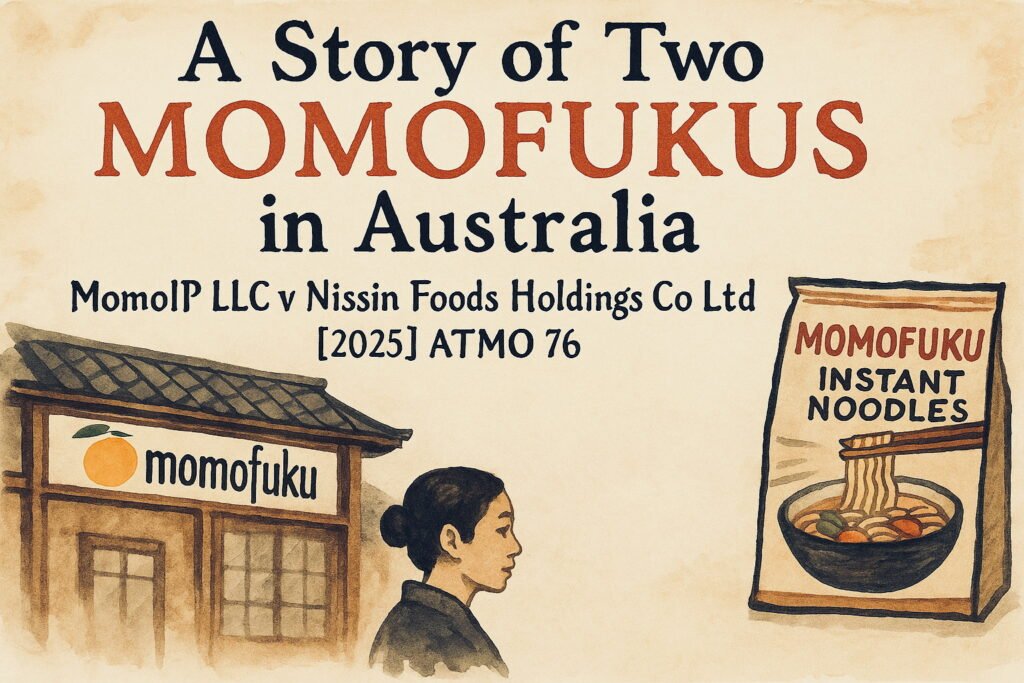Two MOMOFUKUS Down Under Fight for Their Brand
MomoIP LLC v Nissin Foods Holdings Co Ltd [2025] ATMO 76 (2 May 2025)

Can two businesses use the same name, MOMOFUKU, in Australia? One is a fine dining restaurant. The other sells instant noodles. In this case, the Trade Marks Office said yes.
The Dispute
MomoIP LLC owns the Momofuku restaurant group, founded by celebrity chef David Chang. They ran Momofuku Seiōbo, a well-known Sydney restaurant, from 2011 until 2021. They registered MOMOFUKU as a trademark in Class 43, which covers restaurant services.
Nissin Foods, a Japanese company known for instant ramen, applied to register MOMOFUKU for a long list of packaged food products. These fell under:
- Class 29: processed meat and seafood, instant soups, soya milk, potato snacks, and ready meals
- Class 30: instant noodles, pasta, sauces, rice meals, sushi, and ravioli
MomoIP opposed the application. They argued the name had a reputation in Australia, and Nissin’s use would confuse customers. They said people might assume the noodles came from the same company behind the restaurant.
The Trade Marks Office’s View
The key issue was whether the two businesses offered closely related goods and services. The answer was no.
The Office referred to Ragopika Pty Ltd v Padmasingh Isaac trading as Aachi Spices and Foods [2020] FCA 1062. That case had held that restaurant services and packaged foods are not automatically related, even if restaurants serve food.
The delegate explained:
“Goods in Classes 29 and 30 are edible commodities for preparation at home, while restaurant services involve the preparation and provision of food for others, usually to be eaten at the premises.”
In other words, just because both involve food doesn’t mean they’re connected.
Why MomoIP’s Arguments Failed
MomoIP raised four legal grounds. However, none succeeded.
First, under Section 44, they claimed the marks were too similar. But the Office said Class 43 restaurant services were not closely related to Classes 29 and 30 food products. So, there was no conflict.
Second, under Section 58, MomoIP claimed to be the true owner of the name. But they had never sold packaged foods in Australia. They had only used the name for restaurant services. That wasn’t enough to block Nissin.
Third, they relied on Section 60, arguing their restaurant had a strong reputation. The Office accepted the restaurant was known in fine dining. But that reputation didn’t stretch to packaged goods. The delegate concluded:
“I am not satisfied that there is a real risk that a consumer would be deceived or caused to wonder whether there is a connection in the course of trade between the Holder’s Goods and the services of the Opponent.”
Lastly, under Section 42(b), MomoIP said Nissin’s use would break the law by misleading consumers. But the Office found no proof of this. The goods were sold in a different context. The public was unlikely to be misled.
The Outcome
Nissin won. Their application to register MOMOFUKU for packaged foods in Classes 29 and 30 can go ahead. MomoIP’s opposition was dismissed. They were also ordered to pay costs.
What This Means for Business Owners
This case shows that trademark rights depend on use, not just reputation. It also highlights how goods and services are grouped under different trademark classes.
Here are the main lessons:
- Using a name in one category, like restaurant services, does not stop someone from using the same name in another, like packaged foods.
- Courts and trademark offices will look at how the goods or services are sold, who buys them, and whether customers are likely to link the two.
- If you want to grow your brand, register it in the relevant trademark classes early.
As shown in Ragopika Pty Ltd v Padmasingh Isaac trading as Aachi Spices and Foods [2020] FCA 1062, the legal connection between food products and restaurant services is not automatic. You need solid evidence to show that consumers would be confused.
In short, having a strong name isn’t enough. You need the right trademark strategy to protect your brand across different markets and classes.
